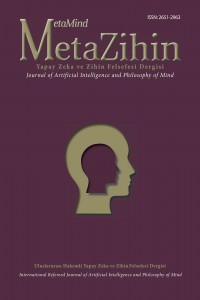Geçmişten Geleceğe Kendiliğe Bir Bakış: Özgünlük, Zaman Ve Özgürlük
Öz: Kendiliğe ilişkin kavrayışımız Descartes’tan bu yana felsefenin en önemli konularından biri olmuştur. Geçmişten geleceğe doğru kısa bir bakış attığımızda, geçmişte bu kavrayışın genel, toplumsal ve belirlenimci olduğu göze çarpar. Modern döneme ve günümüze gelinirken kendilik, toplumsallık ve genellikten sıyrılıp dışsal belirlenim zincirlerini kırarak, bireysellik, içsellik ve özgünlük üzerinden anlaşılmaya başlanır. Bunun doğal sonucu olarak da “ben” artık kendine has olan, farklı olan ve özgür seçimler yapabilen “özneye” gönderme yapmaya başlar. Ancak, kendimize ilişkin bu yaklaşımın gelecekte bu şekilde kalmaya devam edeceği şüphelidir. Bilimsel ve teknolojik gelişmeler, insanları etkileyip onların dünyalarını ve algılarını o denli değiştiriyor ki kendiliğe ilişkin algının değişmeden uzun süre kalacağı pek olanaklı görünmüyor. İleride gerçekleşme olanağı olan; yapay zeka, sanal gerçeklik (metaverse) ve kovan zihin (hive mind) gibi kavrayışlar sonucu, kendilik anlayışımızın bir hayli değişeceği izlenimi oluşuyor. Bu yazıda, geçmişte kendilik anlayışımızın nasıl olduğu, günümüzde ne şekilde dönüşmeye başladığı ve gelecekte nereye doğru evrileceğine dair bir bakış sunulmaya çalışılmaktadır.
Anahtar Kelimeler:
kendilik, özgünlük, zaman, özgürlük, yapay zeka
A Look at the Self from the Past to the Future: Genuineness, Time and Freedom
Abstract: Understanding concerning the self has been one of the most important subjects in philosophy since Descartes. When we try to catch a glimpse from the past to the future, it strikes to the eye that in the past, the perception of the self was general, common and determinist. When we shift our focus towards modern era and the present-day, the self is understood in terms of individuality, internality and authenticity by stripping off its social and general character and breaking free from the outer deterministic chains. As a result, the self, then, starts referring to the free acting agent who is different and original. Yet, it is suspicious that this view of self will remain unchanged in the future. For the scientific and technological developments so much change people’s overall world and the way they perceive that the perception of the self appears not to remain longer without undergoing a radical change. It appears that as a result of the phenomena–possible to happen in the future–such as artificial intelligence, metaverse and hive mind, our view of the self will undergo substantial alteration. This paper aims to present an overview concerning how our conception of the self was in the past, what kind of change it has been undergoing in the present-day and to what it will evolve in the future.
Keywords:
self, genuineness, time, freedom, artificial intelligence,
___
- Arslan, Ahmet (2006). İlkçağ Felsefe Tarihi: Sofistlerden Platon’a. İstanbul: İstanbul Bilgi Üniversitesi Yayınları.
- Aristoteles (1975). Politika. Çev. Mete Tuncay. İstanbul: Remzi Kitabevi.
- Bergson, Henri (2001). Time and Free Will: An Essay on the Immediate Data of Consciousness. Çev. F. L. Polgson. New York: Dover Publications.
- Berman, Rick (Yapımcı) & Frakes, Jonathan (Yönetmen). (1996). Star Trek: First Contact [Film]. Arizona: Paramount Pictures.
- Bostrom, Nick (2004). Superintelligence: Paths, Dangers, Strategies. Oxford: Oxford University Press.
- Brooker, Charlie (Yazan) & Tibbetts, Carl (Yönetmen). (2014). White Cristmas [Tv dizisi bölümü] C. Brooker (Uygulayıcı Yapımcı), Black Mirror içinde. London: Zeppotron.
- Brooker, Charlie (Yazan) & Harris, Owen (Yönetmen). (2016). “San Junipero” [Tv dizisi bölümü] C. Brooker, (Uygulayıcı Yapımcı), Black Mirror içinde. London: Zeppotron.
- Descartes, Rene (1993). “Meditations on First Philosophy.” Stanley Tweyman (Der.), Meditations on First Philosophy in Focus içinde (s. 34-100). London & New York: Routledge.
- Descartes, Rene (2006). A Discourse on the Method. Çev. Ian Mclean. Oxford: Oxford University Press.
- Eliot, Thomas (1931). “Preface.” H. Crosby (Der.), Transit of Venus içinde. Paris: Black Sun Press.
- Engels, Friedrich (2005). Ailenin, Özel Mülkiyetin ve Devletin Kökeni. Çev. Kenan Somer. İstanbul: Sol Yayınları.
- Good, Irwing J. (1965). “Speculations Concerning the First Ultraintelligent Machine.” Franz L. Alt and Morris Rubinoff (Der.), Advances in Computers içinde, 6: (s. 31-88). New York: Academic Press.
- Giddens, Anthony (Der.) (2012). Sosyoloji. Cemal Güzel (Çeviri Der.). İstanbul: Kırmızı Yayınları.
- Harari, Yuval N. (2015). Hayvanlardan Tanrılara Sapiens: İnsan Türünün Kısa Bir Tarihi. Çev. Ertuğrul Genç. İstanbul: Kolektif Kitap.
- Harari, Yuval N. (2016). Homo Deus: Yarının Kısa Bir Tarihi. Çev. Poyzan, N. Taneli. İstanbul: Kolektif Kitap.
- Heidegger, Martin (2001). Being and Time. Çev. John, Maquairre & Edward Robinson. Oxford: Blackwell Publishers Ltd.
- Hume, David (2009). İnsanın Doğası Üzerine bir İnceleme. Çev. Ergün Baylan. Ankara: BilgeSu Yayınları.
- “Idiot.” (2018). In Online Etimology Dictionary. Alındığı URL = https://www.etymonline.com/word/idiot#etymonline_v_1489.
- Kant, Immanuel (1929). Critique of Pure Reason. Çev. Norman. K. Smith. New York: St. Martin’s Press.
- Kant, Immanuel (1999). “Critique of Practical Reason.” Mary Gregor (Der.), Practical Philosophy içinde, (s. 133-272). Cambridge: Cambridge University Press.
- Kant, Immanuel (1999). “Groundwork of the Metaphysics of Morals.” Mary, Gregor, (Der.), Practical Philosophy içinde, (s. 41-108). Cambridge: Cambridge University Press.
- Kurzweil, Ray (2005). The Singularity Is Near: When Humans Transcend Biology. New York: Viking Press.
- Marter, Annie (Yapımcı) & Pfister, Wally (Yönetmen). (2014). Transcendence [Film]. California: Alcon Entertainment.
- Platon (2012). Devlet. Çev. Sabahattin Eyuboğlu ve M. Ali Cimcoz. İstanbul: Türkiye İş Bankası Kültür Yayınları.
- Rosenberg, Mark, E. (Director). (2017). Year Million [Belgesel] USA: National Geographic Channel.
- Ross, William, D. (2017). Aristoteles. Çev. Ahmet Arslan. İstanbul: Kabalcı Yayıncılık.
- Van, F., Bastiaan, C. (2005). “Transcendence of the Ego (The Non-Existent Knight).” Galen Strawson (Der.), The Self? içinde, (s. 87-110). Oxford: Blackwell Publishing.
- Tegmark, Max (2017). Life 3.0: Being Human in the Age of Artificial Intelligence. New York: Alfred A. Knopf.
- Vinge, Vernor (1993). “The Coming Technological Singularity: How to Survive In the Post-Human Era.” Whole Earth Review, Winter 1993.
- ISSN: 2651-2963
- Yayın Aralığı: Yılda 2 Sayı
- Başlangıç: 2018
- Yayıncı: Murat ARICI
Sayıdaki Diğer Makaleler
Biyolojik Doğalcılık Ekseninde John Searle ve Zihin-Beden Problemi
Zombiler ve Fenombilere Zihnimizde Yer Açmak
[Söyleşi] Prof. Dr. Erdinç Sayan ile Söyleşi: Zihnin Doğası Üzerine
Algısal İçerik Kavramsalcılığına Karşı bir Durum: İlk Algı
Geçmişten Geleceğe Kendiliğe Bir Bakış: Özgünlük, Zaman Ve Özgürlük
